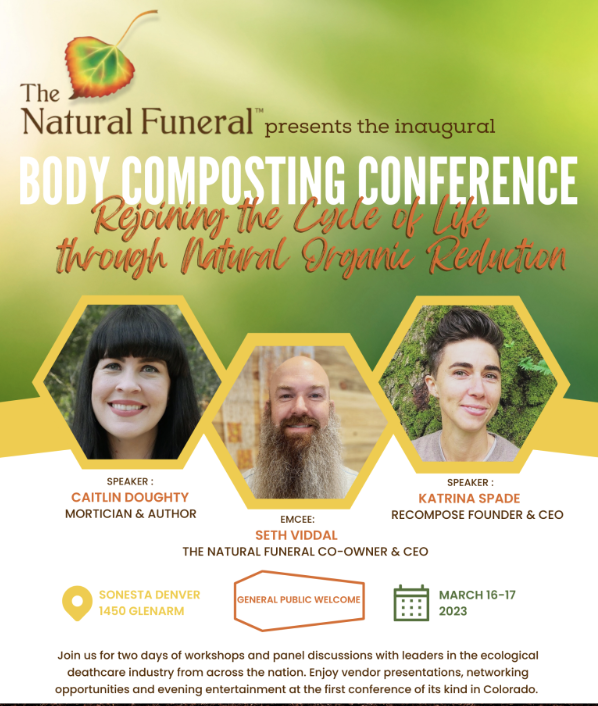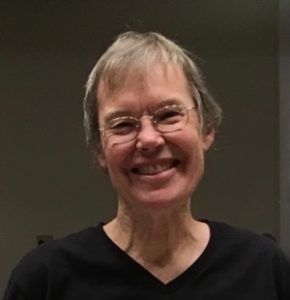I’m learning new words (e.g., terramation) and options in death care, and optimistic about changes now underway. I’m eager to help share the news.
On Saturday morning May 6, 2023, I attended a Zoom program hosted by the FCA of Greater Rochester on the topic of Natural Organic Reduction (a.k.a. Human Composting). Speakers were Seth Vidal from Colorado, founder of Natural Funeral, and Micah Truman, CEO of Return Home, a Seattle-based company. I learned SO much! I’m astonished by the progress that has been made in a short time.
These companies are up and running, offering human composting. They are having success helping families bury loved ones in organic materials, creating healthy soil. During the Zoom program we saw photos and videos of the processes used, and heard comments from the people involved. Families have expressed heart-felt thanks for ways they could be involved; some add flowers or notes into the container, some make repeat visits to sit nearby and say goodbyes; many appreciated obtaining the resulting soil, or taking a portion while donating the rest to help a forest grow.
There’s a spirit of collaboration among these company leaders. “It’s been fun to learn of the operators and their techniques,” said Seth. He admires Micah’s methods and welcomes him. “Together we make it NORmal!”
NOR or N.O.R. are common abbreviations for Natural Organic Reduction, which can also be called NR, Terramation, human composting, or body composting. Micah likes the word Terramation.
Seth reported that 150 people attended the recent Body Composting Conference in Denver held March 15-17, 2023; others participated remotely from Europe, South America, and elsewhere. A recurring theme was how quickly this composting idea is catching on and spreading.
This is “the hottest topic in the consumer realm,” declared Seth. Although his funeral home offers a “wide lane” of options, including traditional burials, private property burials, cremation, aquamation, “NOR is what we get asked about the most!” His company has already done about 75 funerals involving NOR. Micah commented, “Our industry is incredibly fast-growing!”

Composting is of course centuries old. “The process was invented by nature.”
For human composting, credit is given to Katrina Spade, founder of Recompose and an early advocate. She spent years researching, fundraising, and lobbying for legalizing the composting of humans. Her home state of Washington, in 2019, was the first to do so. Oregon, California, and Colorado soon followed. Washington now has at least four companies providing the option. Micah says his company can provide “Terramation services to all 50 U.S. states and Canada.” Sean hopes to open a facility somewhere in New England in the coming year.
I’m excited that greener, more sustainable, options are spreading in the funeral industry. You might think of NOR as an alternative to the funeral industry, but I learned during the May 6 program that professional funeral directors ARE very deeply involved in, and essential to, these new businesses. And, they are receiving thank-you letters and heart-felt messages from their clients, a very pleasant surprise (not something that happened often in their previous years as funeral directors).
Meanwhile, I’ve been watching the legislation in Massachusetts, hoping that one of bills to expand funeral options (by legalizing NOR and alkaline hydrolysis) will pass this session. I’ll be tracking the progress of the current bills, H.2193, S.1339, and S.1451, on https://malegislature.gov/ .
New York has recently approved NOR, but both NY and MA will face extra challenges in attracting NOR facilities because our existing state laws strictly separate funeral homes (businesses) from cemeteries and crematories (required to be nonprofit). Sean and Micah commented that they are unlikely to invest $ in building new facilities where laws are confusing or uncertain for their businesses.
Bottom line: Human composting is a very good step forward, helpful to the Earth. Our bodies can enrich the soil, without using up resources (caskets, concrete vaults, cemetery plots held in perpetuity) or causing air pollution from cremation. The process is gentle and benign. Families can sit vigil and/or create ceremonies to honor the deceased and say goodbyes. There still will be costs (payment for the professionals who provide the NOR services and manage the vessels in which the decomposition occurs), but there will be the satisfaction of giving nutrients back to the earth, sustaining the cycle of life.
